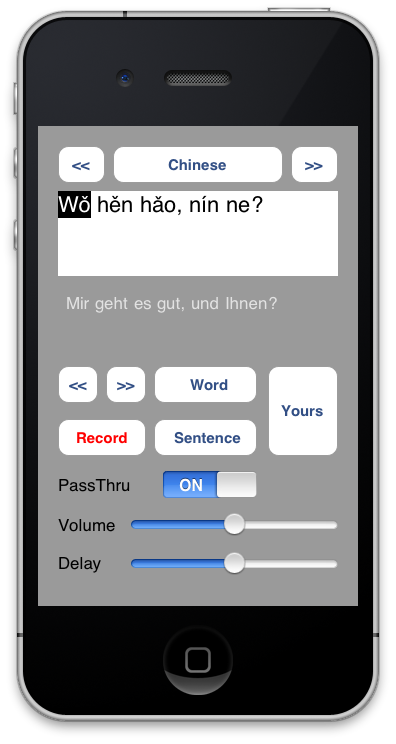I believe the best way to improve your pronunciation in a new language is to listen to yourself not while you speak, but after you spoke. When we speak, we hear our voice as a mixture of air waves from our mouth reflected by the environment and pressure waves transmitted through the skull to the ears. This mixture sounds different from how others hear us. That’s why we are surprised and often shocked when we hear our recorded voice. To improve pronunciation, you need to compare your pronunciation as others hear it to that of a native speaker. The only way to do that is to decouple your speaking from listening to yourself.
You need a headset with noise isolating earphones for this. You listen to a native speaker saying a word in the target language, then you record yourself saying that word, and then play it back and compare the original to your recording. You do this again and again for the word, until you feel you are close enough. Then you practice another word. The best is to practice all words in a sentence, and finally to practice the entire sentence, to not only copy the speaker’s pronunciation for each individual word, but also his sentence melody and speech rhythm.
When I was at uni, I did this for English an hour every day for a few weeks. That helped me quite a lot in improving my pronunciation in a reasonable short period of time. I recorded audio clips from an American radio station, transcribed them, and practiced each one with an audio program on the PC in the way described above until I was as close as possible to the original speaker.
I am doing the same for Chinese now, which I started learning in February. I use the recordings from the Audio CDs that came with the Chinese learning book which we use in our VHS course. This time I wrote an iPhone app to use this method more efficiently. The first version is quite promising and makes it much more comfortable to work on the words and sentences. The method has two premises: listen to your recorded voice as opposed to yourself while you speak, and compare your recorded pronunciation to that of a native speaker as close side by side as possible. After having experimented with the app for quite a bit, the premises seem valid.
Here is a screenshot of the first version of the app:

This version records all the time and plays what it records back with a delay of a few hundred milliseconds, controlled by the delay slider. I had the theory that if you hear a word spoken by a native speaker, say the word yourself at the same time, and hear what you said played back to you with a fixed delay, then there is a specific delay at which you get optimal feedback. However, so far it seems that at least for practicing individual words, it is best to just play the word back not after a fixed time has passed, but right after you finished saying it, so there is no overlap between recording and playback. My next version will make it easier to practice this way.
I will keep posting about what works best for me when learning Chinese. This adventure is as much about learning a language as it is about learning how to learn a language.